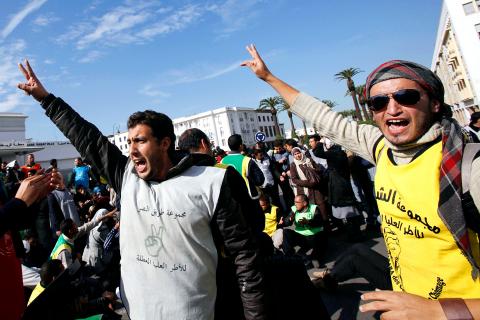Moroccans were choosing a new parliament yesterday in Arab Spring-inspired elections that are facing a boycott by democracy campaigners, who say the ruling monarchy is not committed to real change.
A moderate Islamist party and a pro-palace coalition are expected to do well in the voting, but a key test for the authorities’ legitimacy would be how many voters cast ballots.
The result is being watched by Morocco’s US and other Western allies, as well as European tourists, who cherish its beaches and resorts.

Photo: Reuters
Morocco’s reputation as a stable democracy in North Africa has taken a hit with this year’s protests, and its once-steady economy is creaking from the amount of money the government has pumped into raising salaries and subsidies to keep people calm amid the Arab world turmoil.
The election campaign has been strangely subdued, unlike the lively politicking in nearby Tunisia when it held its first elections prompted by the Arab uprisings last month.
In Morocco, posters and raucous rallies for candidates are absent in the cities and instead there are just stark official banners urging citizens to “do their national duty” and “participate in the change the country is undergoing.”
“The parties have presented the same people for the past 30 years, the least they could do is change their candidates,” said Hassan Rafiq, a vegetable vendor in the capital, Rabat, who said he did not plan to vote.
Like elsewhere in the Arab world, Moroccans hit the streets in the first half of this year calling for more democracy, and King Mohammed VI responded by amending the constitution and bringing forward elections, but since then the sense of change has dissipated.
US-based Human Rights Watch said that since Oct. 20 the government has taken more than 100 activists in for questioning for advocating a boycott.
“Moroccans feel that aside from the constitutional reform, nothing has really changed, meaning that the elections of 2011 will be a copy of the elections of 2007 and that is what will probably keep the participation low,” Islamist Justice and Development Party deputy secretary-general Abdellah Baha said.
The 2007 elections, the first with widespread international observation, had just a 37 percent turnout and some fear it could be even lower this time around.
The constitutional referendum passed with more than 98 percent voting in favor and a staggering 72 percent turnout, which most observers found hardly credible.
Morocco, with its many political parties and regular elections, was once the bright star in a region of dictatorships, but all that has changed with the Arab uprisings that toppled dictators in Tunisia, Libya and Egypt. Now a political system that holds elections, but leaves all powers in the hands of a hereditary king, does not look so liberal.
Under the new constitution, the largest party must form the government, which could well be the Islamist party, known by its French initials PJD, but there is uncertainty over whether it can truly change anything.
The Islamists’ biggest rival for the top spot is Moroccan Finance Minister Salaheddine Mezouar’s Rally of Independents, which leads an alliance of seven other pro--palace parties.

In the sweltering streets of Jakarta, buskers carry towering, hollow puppets and pass around a bucket for donations. Now, they fear becoming outlaws. City authorities said they would crack down on use of the sacred ondel-ondel puppets, which can stand as tall as a truck, and they are drafting legislation to remove what they view as a street nuisance. Performances featuring the puppets — originally used by Jakarta’s Betawi people to ward off evil spirits — would be allowed only at set events. The ban could leave many ondel-ondel buskers in Jakarta jobless. “I am confused and anxious. I fear getting raided or even

Kemal Ozdemir looked up at the bare peaks of Mount Cilo in Turkey’s Kurdish majority southeast. “There were glaciers 10 years ago,” he recalled under a cloudless sky. A mountain guide for 15 years, Ozdemir then turned toward the torrent carrying dozens of blocks of ice below a slope covered with grass and rocks — a sign of glacier loss being exacerbated by global warming. “You can see that there are quite a few pieces of glacier in the water right now ... the reason why the waterfalls flow lushly actually shows us how fast the ice is melting,” he said.

RISING RACISM: A Japanese group called on China to assure safety in the country, while the Chinese embassy in Tokyo urged action against a ‘surge in xenophobia’ A Japanese woman living in China was attacked and injured by a man in a subway station in Suzhou, China, Japanese media said, hours after two Chinese men were seriously injured in violence in Tokyo. The attacks on Thursday raised concern about xenophobic sentiment in China and Japan that have been blamed for assaults in both countries. It was the third attack involving Japanese living in China since last year. In the two previous cases in China, Chinese authorities have insisted they were isolated incidents. Japanese broadcaster NHK did not identify the woman injured in Suzhou by name, but, citing the Japanese

RESTRUCTURE: Myanmar’s military has ended emergency rule and announced plans for elections in December, but critics said the move aims to entrench junta control Myanmar’s military government announced on Thursday that it was ending the state of emergency declared after it seized power in 2021 and would restructure administrative bodies to prepare for the new election at the end of the year. However, the polls planned for an unspecified date in December face serious obstacles, including a civil war raging over most of the country and pledges by opponents of the military rule to derail the election because they believe it can be neither free nor fair. Under the restructuring, Myanmar’s junta chief Min Aung Hlaing is giving up two posts, but would stay at the